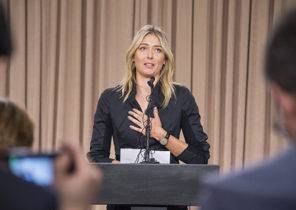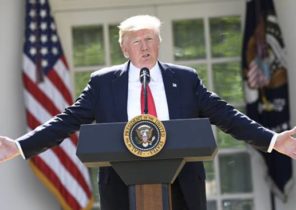
One of the most important foreign policy puzzles of the new U.S. administration is how it will relate to increased international aggression of Russia and its recent military adventures. Many signals in recent weeks, including those directly concerning the Russian-Ukrainian confrontation, indicate the friendly attitude of the new us President and some of his companions to Putin. Against this background, the rapprochement between Moscow and Washington can go beyond previous attempts of the early new American administrations to reset relations with the Kremlin. Donald trump and his advisers seem to hope that a more tolerant attitude of the US to the claims and shares of Russia on the territory of the former USSR and, in particular, in Ukraine, the Kremlin will encourage to cooperate more closely in such areas as the struggle against Islamist terrorism or confrontation with the geopolitical rise of China, and in regions such as Syria or the Arctic.
But you know, Donald trump, Rex Tillerson and their colleagues until the end, how high the stakes are in this game? These risks relate not only to the fundamental national interests of these Pro-American countries like Ukraine, Estonia, Georgia and Poland. Possible new tolerance of the US in Russia’s violations of Ukrainian territorial integrity would have serious consequences for the rest of the world. In particular, a departure from the assurances about security, which the United States gave to Ukraine in the framework of the so-called Budapest Memorandum of 1994 would be another violation of logic and the already shaky international nuclear nonproliferation regime.
What is the background to this disturbing development? During the CSCE summit in Budapest in December 1994, three States that are legally allowed to possess nuclear weapons under the Treaty on the nonproliferation of nuclear weapons (NPT), Russia, the US and the UK — signed a Memorandum on guarantees (for English: assurances — assurances on) security, including, among other things, the inviolability of Ukrainian borders. In turn Kiev as well as Minsk and Almaty — then agreed to give up weapons of mass destruction that they inherited from the Soviet Union. China and France as two other official nuclear powers under the NPT also confirmed its respect for the sovereignty and borders of Ukraine, in a separate governmental declarations. Thus, the largest world powers and permanent members of the UN security Council has publicly acknowledged its obligation to respect and protect Ukrainian territorial integrity. Ukraine acceded to the NPT and to start.
However, Moscow in 2014, if not sooner, defiantly and categorically violated the Budapest Memorandum, which ensured Ukraine’s sovereignty, which Russia (in addition to the US and the UK) signed 20 years ago. For the rest of the world the importance of this event is that the official assurances of all the official nuclear powers and permanent members of the UN security Council 1994, became the actual, if a formal Supplement to the Treaty on the nonproliferation of nuclear weapons (NPT). Therefore, the violation of the Budapest Memorandum the continued Russian occupation of territory of Ukraine not only infringe on the sovereignty of Ukraine. They undermine the logic of the functioning and reliability of the international framework to limit the spread of nuclear weapons.
Moreover, two other official nuclear powers under the NPT, Beijing and Paris, since then, though less demonstratively, but also participated in mediocre undermining of the nonproliferation regime. Beijing in 2014 did not support the resolution of the UN General Assembly against the annexation of Crimea to Russia, and several prominent French center-right parliamentarians visited Crimea after its joining Russia in 2016, though the center-right government of France in 1994 officially declared their respect for the sovereignty and borders of Ukraine.
If now the US will change its position, the UK will remain the only state-the guarantor of the NPT and behaves towards Ukraine more or less in accordance with the logic of the global non-proliferation regime. However today, against the background of various international crises, the topic of nuclear proliferation is a hotly debated on the world stage, Western media, among European and American experts. But still, the issue is one of the most basic to the preservation of peace on the planet and ensure the survival of humanity.
Moreover, the policy of appeasement of Moscow may not reduce and even increase the likelihood of escalations in the former Soviet Union. Russia was previously dissatisfied with their previous territorial gains in other post-Soviet republics, namely Moldova and Georgia, while the West went to meet Moscow. Neither the so-called Strategic partnership of the EU with Russia, nor the so-called Partnership for modernization in 23 countries-members of EU with Russia or a number of other Western-Russian institutional cooperation and bilateral and multilateral schemes are unable to prevent a deep undermining European security system Moscow in 2014. Implicitly, the West’s recognition of the Russian protectorates in Transnistria, South Ossetia and Abkhazia, on the contrary, clearly played a role in the fact that the Kremlin decided on the annexation of Crimea and covert military invasion of Donbass.
I should add that the Republic of Moldova in 1994 in Article 11 of its Constitution declared non-aligned status of the state. However, for the last more than 20 years, continuing neutral status of Chisinau have not helped him finish the Russian support for Transnistrian separatism. While knowledge about these and similar “details” of post-Soviet international relations is not very common in the West, such cases are commonplace in Ukraine and other former Soviet republics. Frequent suggestions by Western diplomats and politicians will decide the Western-Russian conflict by turning Ukraine into a permanently neutral state (sometimes under the slogan of its “Finlandization”), on the background of the Moldovan and other experiences of the post-Soviet republics with Moscow, seem inappropriate. These ideas cause surprise and disappointment in Kiev, who does not understand the ongoing Western naivety about Putin and Co. Due to Ukrainian suffering during the last three years, the West will not be able to rely on the fact that Ukraine will agree to the recognition of their territorial losses and its future non-aligned status just because Henry Kissinger, Donald trump and others tell her to do so.
There will be various other side effects from a possible future American connivance against Russian imperialism. If the United States do either explicitly or implicitly accept the fact of annexation of the Crimea, it will lead to a General weakening of international law in the former Soviet Union, because Russia officially confirmed the Ukrainian borders in Budapest Memorandum. Moscow and a number of other important documents repeatedly and unequivocally agreed with the Ukrainian border, among them Belovezhskaya agreement of 1991, the Treaty on friendship, cooperation and partnership between the Russian Federation and Ukraine of 1997, the Agreement on Russian-Ukrainian border in 2003 and so Therefore, the consent of the United States with the recent territorial expansion of Russia to give a dangerous signal to all political leaders in the post-Soviet space and beyond.






